Ni Hao! Arriving in Beijing, I was quite glad that - before leaving the UK - I'd used accumulated Airmiles to book a couple of nights in a hotel. It was well nice to indulge in some 'flashpacking' at the end of all the train journeys from Russia, especially as the hotel was the first I've ever stayed in where you get a 'towelling robe' like in the films!
The next day some of us from the train had arranged to meet up, and after trying out the Beijing metro (much simpler and easier than Moscow) and walking along Tian'anmen Square past thousands of Chinese tourists as well as hundreds policemen dotted all over the place, I got to the arches under the huge portrait of Mao, and the five of us eventually found each other amongst the crowds and headed for the Forbidden City.
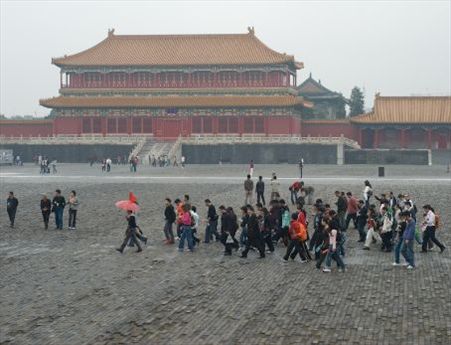
With supposedly 9,999 buildings over a huge area right in the middle of Beijing, The Forbidden City was much bigger than I'd expected, and 'forbidden' because normal Chinese people were never during Imperial times. Officially the 'Palace Museum', and home to five centuries of Ming and Qing emperors and their entourages - sometimes including several thousand concubines plus lots of eunuchs, who were castrated to remove any possibility of them messing around with the emperor's beautiful concubines, and not reunited with their testicles until death, when they were buried with them in bags hung from their belts!
It was a shame that many of the grander buildings were being restored in time for the Olympics (though there were still plenty of builings to keep us busy), and - as I think often the case in Beijing, the sky was a universal bright white. So no chance of taking many photos for iStockphoto, but certainly the crowds were not put off - huge tour groups wearing red hats were shouted at by guides with megaphones.
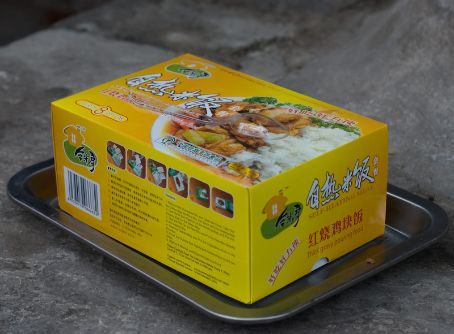
When we eventually came to a food stall at the north end, it was time for a late lunch, and there was no way any of us could resist a self heating "thick gravy pouring food" meal! And at less than £1 for lunch, at an official stall at one of China's top tourist sites, it seemed like a bargain. The woman behind the counter dealt with each box with military precision, setting off the heater, stabbing the water pouch, sorting out the food pouches, and firmly telling each of us "8 minute... OK". As we went outside to find somewhere to sit, plumes of steam started to come from every part of the box, and they rattled around, getting hotter and hotter. After waiting for 8 minutes, we got munching, and with the four guys marvelling at the technology involved and Gary seriously considering quitting his job to start a self heating food UK import company, it took Eva to point out to us that it tasted pretty awful and was full of bones. But we didn't really care if it was Ming-ing, it was hot as if by magic!
Having read and heard about the rip off scams involving friendly students who want 'to practise their English' and 'to show you their art gallery', I was amazed how many of them there were in the Forbidden City, and I must look like a sucker, as they all seemed to go for me!
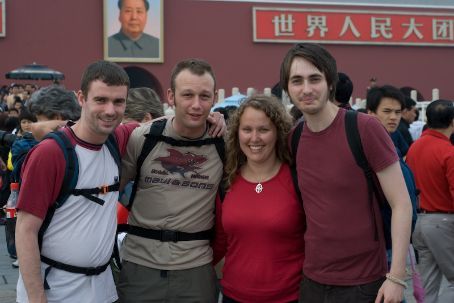
But I eventually managed to shake them off, and after many hours in the Forbidden City, followed by an exploration of Beihei park before it got dark, we found a restaurant which served Peking (Beijing) Duck and despite a significant language barrier problem, the five of us managed to successfully order a huge feast. With new dishes arriving all the time, we still managed to eat almost everything, and the most incredible thing was the bill, which came to about £3.60 each, including tea and beer.
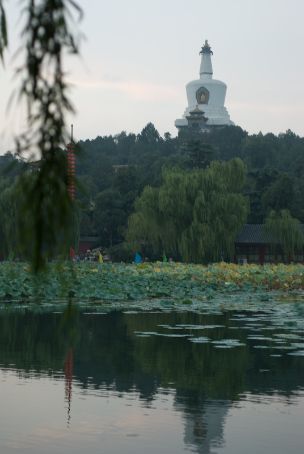
The White Pagoda at Beihei Park
Moving from my hotel to a hostel after two nights gave me a proper impression of the scale of Beijing. I later realised that distances which on the map look like just a few blocks, can take over an hour to walk, but I thought I was well prepared for the taxi journey, having circled the hostel's location on an official map of the city as well as having the name and address in Mandarin.
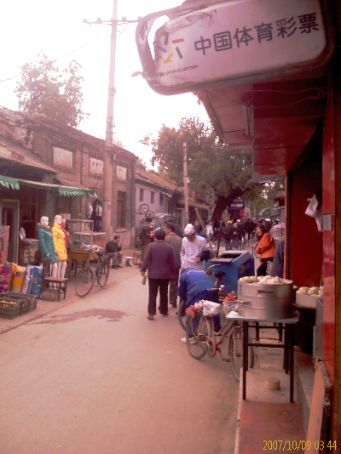
The driver did a deal with me that he'd find the hostel for 50 Yuan (just over 3 pounds, which is a lot for a taxi here - most of my journeys in Beijing were about a pound), and I thought all the conferences with his driver mates, then the 5 phone calls that he made on the way were done for effect. It only took us 20 minutes to get to the right streets as marked on the map, but then we had a further 45 minutes of driving up and down different hutongs - filled with people, bikes, food being cooked and sold, and all sorts of vehicles and things going on, while the driver got out every five minutes or so to ask directions to the hostel.
Eventually we did find it, and the driver was grateful to be on his way again. Then I had another adventure - I was at the right hostel, but I was staying in an overflow place just up the road. A hostel employee with a tricycle put my rucksack in his trailer and told me to jump in, but I motioned to him that I didn't want to weigh him down, so I'd walk. He gave a bemused 'fair enough' expression, then jumped behind the handlebars and zipped off along the busy hutong.
As I ran along, trying to keep within sight of him without knocking into people or being run over he occasionally looked back and laughed as he turned corners, but we both got there in the end.
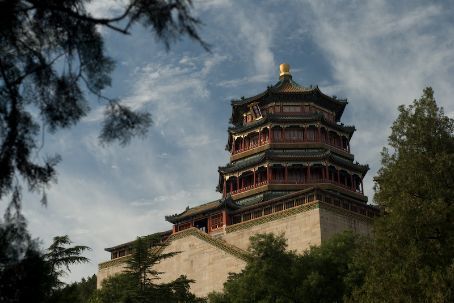
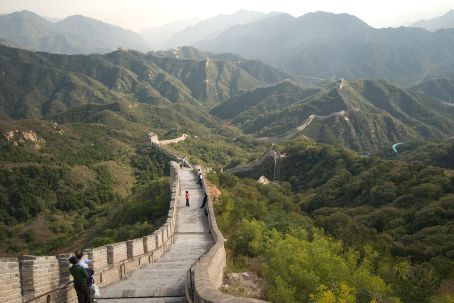
Touristy wise, I also made it to the Summer Palace, and the Great Wall (in the end I had to go to Badaling, which is very touristy - the part we walked was 100 times busier than above, and heavily restored but still pretty amazing), plus got a drive by look at some of the 2008 Olympic sites. As well as a huge countdown display off Tian'anmen Square, adverts on bus stops around the city show how many days are left to go, and at just over 300 and counting, it looks like there's no shortage of work still to do. But Beijing certainly seems has Olympic fever. On Tian'anmen Sq you get hassled to buy maps and booklets, Chairman Mao watches and keychains, plus rip offs of the official olympics characters!
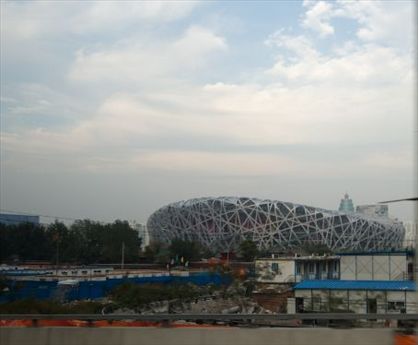
The main olympic stadium, aka 'the birdsnest'
We had two excellent farewell nights in a row as the group of us who'd met at different times on the trains from Russia went our separate ways.
After five nights in Beijing, I left my hostel and found a taxi, thinking that an hour and a bit was plenty time to get to the train station for my overnight train to Shanghai. All was going well and we were on the inner of the three huge ring roads which go around the city, when the driver slammed on his brakes to avoid hitting a stopped car infront, and WHACK! the car behind had sailed straight into us at speed. After some prolonged damage inspection, and friendly discussion between the drivers, the police were called, and I had to get my stuff and try to find another taxi, which proved to be quite hard in the dark, especially once the police had arrived. But as soon as I went the other side of a parked coach, taxis were willing to stop, and I made it to the station in time to incredibly bump into Eva, who was booked on the same train as me, and into the same hostel in Shanghai.
Eva had managed to break or sprain her ankle on the great wall, so gallantly (and partly because she told me to!) I swapped tickets with her so that I was far away up at the front of the train, and she was 14 carriages nearer the platform entrance.
Because the standard 'hard sleeper' option was long sold out, I'd gone for the luxury 'soft sleeper' ticket - about 33 pounds (versus just over 20 for hard sleeper), and shared the 4 person cabin (just like the Russian and Mongolian kupe cabins in layout, but more plush and comfortable) with a Chinese family of three.
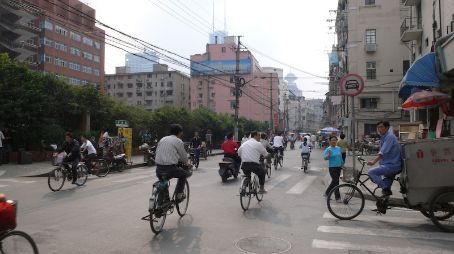
In Shanghai, I stayed in a hostel dorm which cost 50 yuan - just over £3 a night. And incredibly, that's quite expensive compared to most of the rest of China, where hostel dorm beds apparently start from about 15 or 20 yuan!
Shanghai is home to more than 16 million people and supposedly is still growing fast - despite the one child policy and 300,000 abortions per year. The city didn't seem that huge until we viewed it from the Oriental Pearl TV Tower building, where the skyscrapers and apartment blocks went on and on until they disappeared into the haze.
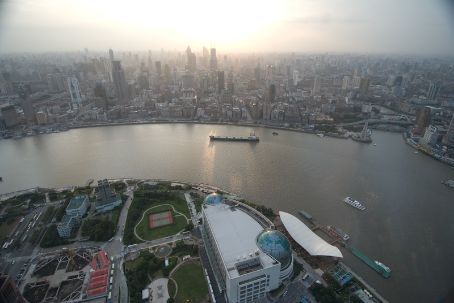
Also on the newer Pudong side of the huge and dirty Huangpu river, we went to a gigantic shopping mall, and the city's aquarium - complete with the worlds longest underwater viewing tunnel, and lots of jellyfish!
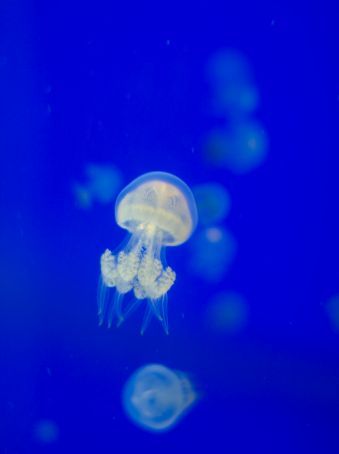
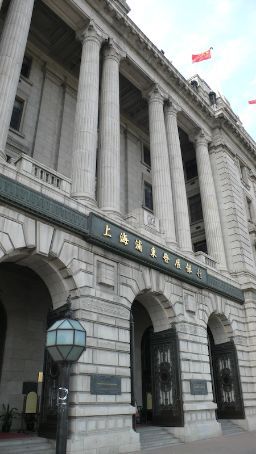
On the Bund, back on the older side of the river, I found the huge former HSBC headquarters, one of the grandest buildings there. The building is now used by Pudong Development Bank, with HSBC now banished to the Pudong side of the river (opposite the bund).
A large sign details the many rules and restrictions for the building (which include the fact that wearing slippery dress and laughing is forbidden - and any failure to abide by the regulations will be punished accordingly) I was brave enough to go in, and the huge marble interior was very plush and suitably stuffy. And there's still an octagonal set of paintings set into the ceiling showing what were HSBC's most important offices: Hong Kong, Bangkok, Tokyo, Calcutta, Shanghai, New York, Paris and London.
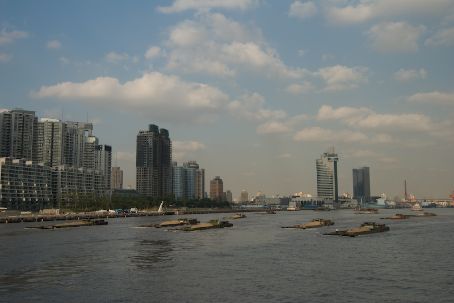
Eva and I went on a quick river tour of the Huangpu river - and once our boat turned around we were followed by an army of boats carrying sand to presumably one of the many, many construction sites in Pudong. There are literally dozens of huge skyscrapers being built, all within a kilometer or so of eachother
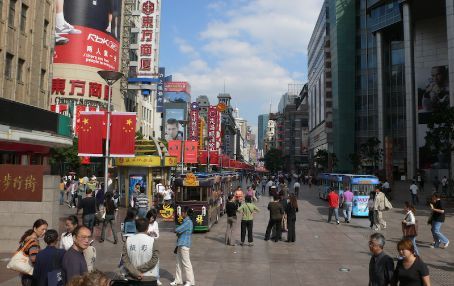
Apart from that, I didn't really do many tourist things in Shanghai - spent some time wondering along Nanjing Lu, which is supposedly the busiest shopping street in the whole of Asia. But for all the huge TV screens and neon lights, the most incredible thing was that you literally couldn't take more than five paces anywhere on the whole street without being set upon by people wanting you to come to their nearby shops to buy watches, bags, jewelry, hats, shoes etc., or by the groups of students wanting to 'practise their English'.
China so far
- Blast from the past: Ring pulls on cans are the old fashioned type where the ring pull comes off
- The language barrier can be quite a problem, most people don't speak a word of English - I wish I'd learned more than the 5 words that I know at the moment, am still trying to pick more up.
- The 'great firewall of China' really does exist - though it's not the same in all cities, blocking access to BBC News, Wikipedia and many other sites - sometimes including (for some reason) facebook.
- Spitting (after doing a very loud impersonation of a coffee percolator) is indeed very common. It's not that bad though.
- Staring... I heard this can be quite strange, but - so far only in the big cities - it's not been bad. Most people ignore you completely, but some do stop and stare intently which can be weird. The most extreme version was walking back to the hostel late after one of our farewell nights in Beijing. There was a work group out fixing the pavement, well after midnight on a Sunday night. I think they might have been prison labourers or something, and when I walked past, most of the workers just stood motionless and stared blankly, until the people in charge shouted angrily and they returned to their shovels.
- 'Hello'... People really do stop you in the street just to smile and say 'Hello'. Children quite often shout it and then laugh and run away.
- Despite the fact that China's still a police state, people seem to have a healthy contempt for many of the rules, especially with regard to traffic lights etc (crossing the road on a green man is very risky!). On a taxi journey in Shanghai, my driver was lost, so approaching a busy interchange where two policemen were trying to keep some sort of order, he put his seatbelt on, then stopping a whole lane of horn blowing traffic to ask one of the very unamused policemen how to get somewhere. He thought it was hilarous as we drove on.
Some traffic lights even have a countdown to when the lights are going to change.
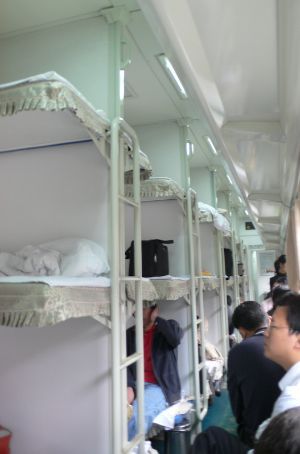
Shanghai to Xian
This time I did manage to get a 'hard sleeper', and found my bunk for the 18 hour train journey. It was very clean and high tech, but once again I was annoyed that I couldn't speak the language, so my communication in the open carriage was limited to smiling and waving at the baby that the family on the bottom bunks had. Being about 9 feet up on the top bunk was fine, but it did have it's challenges due to the tiny amount of space above the bed. Any kind of turning around to get to the ladder was an acrobatic challenge!